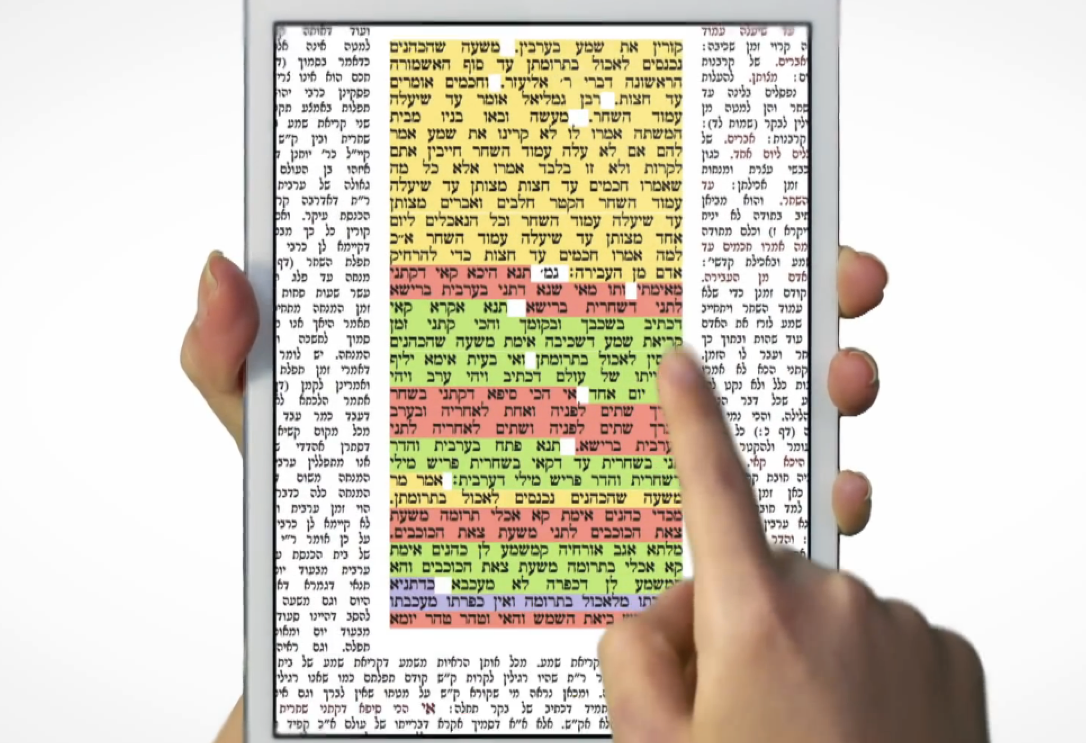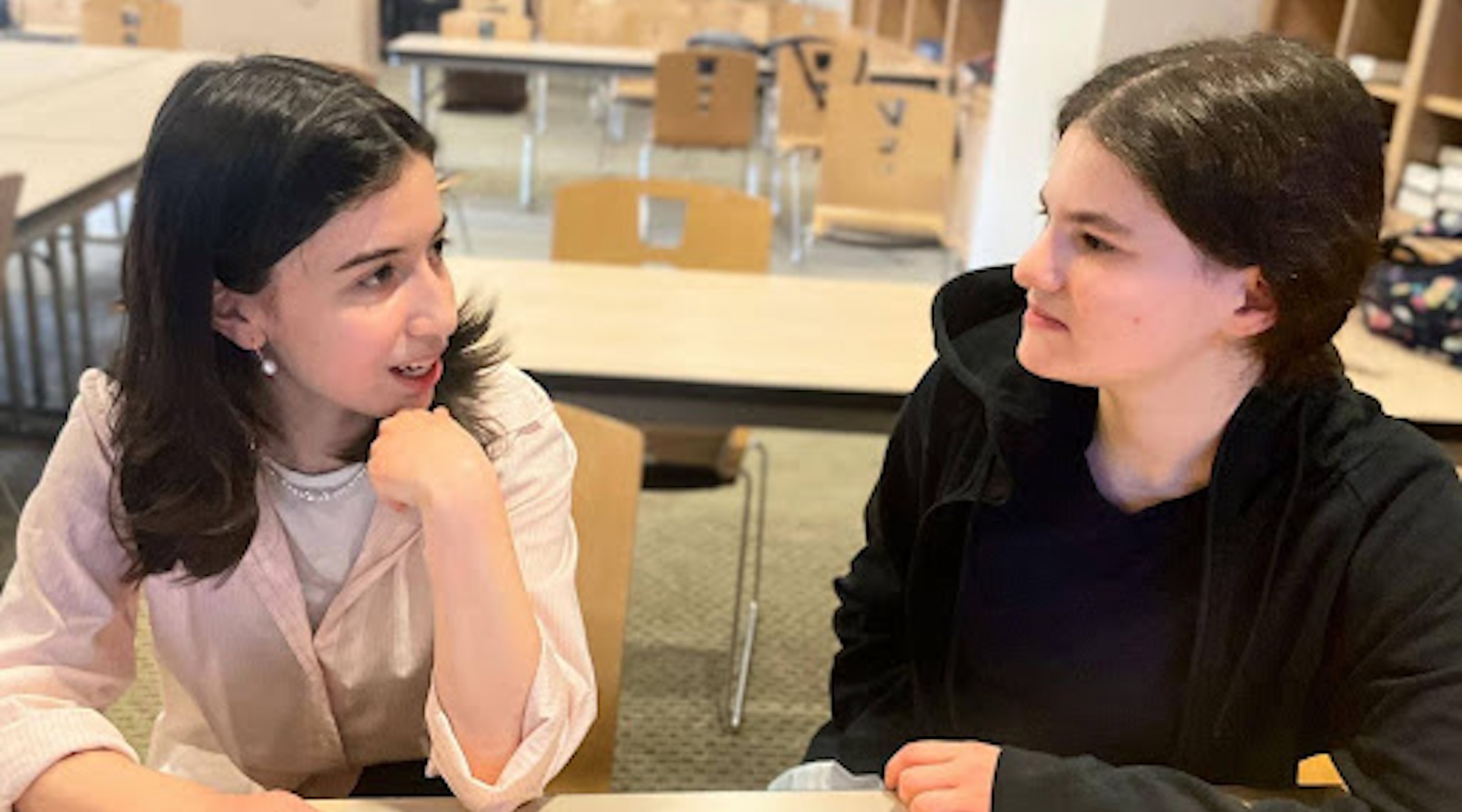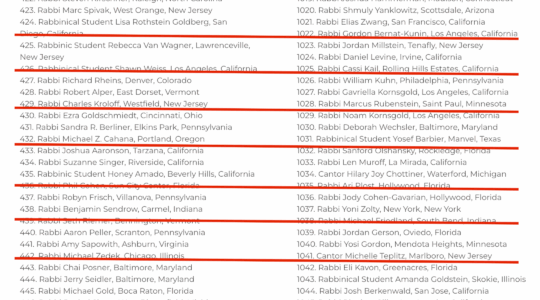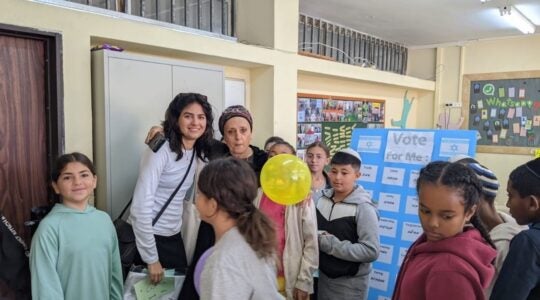This article was produced as part of JTA’s Teen Journalism Fellowship, a program that works with Jewish teens around the world to report on issues that affect their lives.
Instead of spending their free periods doing homework or hanging out with friends, Talia Beck and Jordana Bruckheimer like to talk about what they learned that day in Talmud.
It’s a conversation they began in ninth grade, when they committed themselves to the page-a-day reading of the massive compendium of Jewish law — a practice known as Daf Yomi. And starting two years ago, it’s a conversation they’ve been sharing with others through their podcast called “Daf Punk.”
When they started the podcast, in part to help girls like them access the Talmud, they felt like they were some of the few teens learning Daf Yomi. Now, with the help of their podcast and other initiatives, more teens are participating, making them part of a world of podcasts, newsletters and other media dedicated to the study of ancient Talmud.
“It’s the world’s largest book club,” said Beck, “and it’s incredible.”
Although no official count exists — Daf Yomi is studied individually without formal tracking — teen participation appears to be increasing, according to anecdotal evidence from people JTA talked to.
“Last year was the first year I felt like there was a huge Daf Yomi culture and it feels like that hasn’t stopped,” said Rabbi Dovi Nadel, rosh beit midrash (head of study) at SAR High School, a Modern Orthodox day school in Riverdale, New York.
“Daf Yomi appeals to high school students in a similar way to a marathon,” said Rabbanit Michelle Cohen Farber, founder of the women’s learning program Hadran, who has spoken to many teens about their experience doing Daf Yomi. “Like a marathon, Daf Yomi offers a clear, attainable goal that creates a sense of purpose and direction. It connects students to a global community of learners sharing the same values and practices. And while a marathon provides exercise for the body, Daf Yomi offers exercise for the mind and soul.”
Beck and Bruckheimer, seniors at North Shore Hebrew Academy, an Orthodox high school in Long Island, created their podcast to inspire teens — especially girls — to take on Daf Yomi and Torah learning. Beck realized at a Daf Yomi shiur, or class, she attended at her synagogue that she was “the only girl and the only person under 50.”
Each day, she and Bruckheimer study the Daf individually and then record a five-minute episode, summarizing the main ideas. Their podcast is meant as a jumping-off point to inspire other learners.
Daf Yomi is a serious commitment that is largely taken on by adults, not kids. Literally meaning “page of the day,” it is a daily program of studying the Babylonian Talmud, a collection of commentaries and teachings on the Torah. With 2,711 double-sided pages, one Daf Yomi cycle takes about seven years and five months.
The current cycle started in January 2020, when Beck and Bruckheimer joined in, and will end in June 2027. Traditionally undertaken alone, with a chavruta (study partner) or in a daily class, Daf Yomi study has spread through podcasts, YouTube videos and TikTok accounts. “Daily Dose of Talmud,” a newsletter from JTA’s partner site My Jewish Learning, has 35,000 subscribers.
The technology is providing new ways for people of all ages and backgrounds to access learning of the Talmud’s often esoteric subjects, from agriculture and biblical sacrifices to everyday ethics and laws of property and damages.
Elisheva Scharf, a senior at Gann Academy, a pluralistic day school in Waltham, Massachusetts, was inspired to start Daf Yomi at age 12 after attending a women’s Siyum HaShas, the celebration marking the end of a Daf Yomi cycle, in Israel.
“It was amazing,” Scharf said, “it felt like thousands of women singing. That sense of community was incredible.”
Scharf was not far off in her estimate. In 2020, Hadran, an organization for advancing Talmud study for women, hosted the first international Siyum HaShas for women in Jerusalem, a celebration of the last cycle’s completion. Over 3,300 women attended, including Scharf.
Tens of thousands of Jews worldwide study Daf Yomi, and over 90,000 people mostly haredi Orthodox Jews attended the 2020 Siyum HaShas, the cycle-ending celebration, in New Jersey’s MetLife Stadium. For adults, this commitment can be easier to fit into a schedule. But for teens, balancing Daf Yomi with school, extracurricular activities and social lives is challenging.
“It’s definitely hard to do,” said Scharf. “Falling off track is a constant concern.”
Scharf learns the Daf on weekdays through Michelle Farber’s 30-minute podcast for Hadran, “Daf Yomi for Women,” the first and perhaps only daily Talmud class taught by a woman. On weekends, Scharf studies directly from the text.

New technology, like Mercava’s “Daf Yomi” app, has made the daily study of Talmud accessible to all ages and backgrounds. (Courtesy of Mercava)
Summer is especially tough for teens to stay on schedule. In 2024, Scharf fell behind after a 10-day summer program. She returned during a particularly dull section of the Gemara — the dense rabbinic commentaries that accompany the Mishna, the collection of Jewish oral traditions that form the spine of the Talmud. She lost motivation, and fell a month behind.
“It was super overwhelming and I wanted to quit,” she said. Determined to continue, she caught up by listening to the Hadran podcast, making up 30 days of learning. “After that,” Scharf said, “I was never going to fall behind again.” For the most part, she has stuck to that commitment and is currently on track to finish with the cycle in 2027.
“This is the only learning that I do lishmah [or its own sake], not for a grade or anything, just for fun,” said Daveed Sarna, a high school sophomore from New York City.” I think there is something special about learning just for the sake of learning.” Sarna joined the cycle part-way through in 2023 and he hopes to finish it in 2027 when the cycle ends.
“Kids want daily learning programs outside their regular studies,” said SAR’s Nadel. “When you’re forced to learn, it feels very different than when you choose to.”
Hadar Simkotvitch, a senior at Ida Crown Jewish Academy, a Modern Orthodox high school in Chicago, faced struggles when deciding to learn Daf Yomi. At her more traditional Orthodox middle school, she did not always feel supported. “For the last Siyum boys blocked the doors, and girls literally couldn’t go in,” she said. “The community that I’m in feels a step behind in terms of Gemara for women.”
Traditionally, advanced Torah learning, particularly Gemara, was reserved for men. Women’s Jewish education focused on basic texts and Jewish law. In the 1950s and 1960s, women began advocating for deeper Jewish learning. Since then, more institutions have provided Gemara study for women, but enthusiasm and encouragement is still often lacking for girls.
When Simkotvitch first expressed interest in Daf Yomi, many dismissed her, claiming women were too “emotional” to study Gemara. Over time, however, she found more support, especially after transferring to Ida Crown. Though she still wishes there was more encouragement for girls, she has found an environment that at least tolerates her learning.
In a recent four-minute episode of Daf Punk, Beck and Bruckheimer summarized a page from Sanhedrin (the tractate “courts”) that dealt with the coming of the Messiah. Beck opened up the discussion with a playful hook: “The End of Days, with a few study hacks thrown in.” They unpacked Rabbi Akiva’s teaching on how to learn Torah — once a month, then once a week, then once a day — likening it to the way teens today scroll on “study-hack TikToks” that teach them similar tactics.
Beck and Bruckheimer bantered effortlessly and conversationally, with humor and modern day references.
The two hope to inspire all teens but especially want to encourage girls to engage more deeply with Torah. “It’s important for girls especially to look into this,” said Beck
Beck knows Daf Yomi isn’t for everyone, and other forms of learning are valuable as well. But her advice for other girls remains: “Learn a lot of Torah; it is part of your life as much as it is any guy’s.”
JTA has documented Jewish history in real-time for over a century. Keep our journalism strong by joining us in supporting independent, award-winning reporting.






